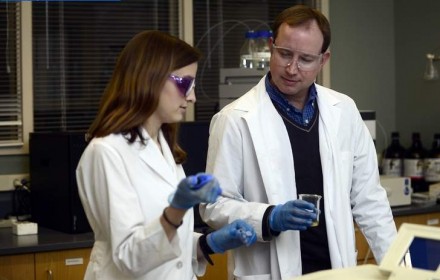NIH Invests $626,000 In Converse Biomedical Research Program

Converse College has received more than $626,000 in support of biomedical science research and student training from SC INBRE and the National Institutes of Health (NIH). Converse will use the funds for research initiatives, enhancements to laboratories and equipment, and expansion of K-12 outreach.
“Today, the sciences at Converse are garnering recognition and investment at the highest national level.”
The funding is part of the NIH’s five-year, $18 million Institutional Development Awards (IDeA) grant to South Carolina, where Converse will partner with colleges and universities across the state in an effort to strengthen the Palmetto State’s biomedical research capacity.
IDeA was created in order to build capacity in 23 states that have traditionally received low levels of federal research funding. The University of South Carolina School of Medicine administers South Carolina’s program in partnership with Clemson University, the Medical University of South Carolina and nine competitively-selected predominantly undergraduate institutions, including Converse.
The SC IDeA Network of Biomedical Research Excellence (SC INBRE III) award will provide Converse with $247,000 in the first year, and a minimum of $500,000 over the full five-year award period. Additionally, SC INBRE III’s Developmental Research Program (DRP) will provide a Converse faculty member with $126,000 over the next 18 months, with the opportunity to renew for three additional years.
“This National Institutes of Health grant provides unprecedented opportunities for our students and faculty in scientific research emphasizing biomedicine, reflecting the high quality and tremendous growth of our science programs over the last decade,” said Dr. Jeff Barker, provost. “Converse is ideally positioned to promote achievement by women in the sciences. The grant funding will help us continue our growth in science faculty, facilities, research initiatives, partnerships, and outreach programs, all of which serve our growing population of science majors. Today, the sciences at Converse are garnering recognition and investment at the highest national level.”
Dr. Neval Erturk, Chair of Biology, Chemistry, and Physics and Co-Director of the Undergraduate Research Program is the Principal Investigator for the Converse program. She will oversee the selection and funding of 15 faculty and 25 undergraduate students as well as coordinate outreach activities in the biomedical sciences across disciplines.
Converse’s outreach program, called Science and Technology Research Scholars (STARS), cultivates interest in scientific research careers by pairing outstanding high school students with Converse faculty for long-term, in-depth science and technology projects. High school students are individually mentored by Converse faculty in biology, biochemistry, psychology and computer science. The grant will enable expansion of the STARS program to include additional high school students as well as one high school Teacher Scholar each year. Teacher Scholars will receive training and continuing support to incorporate their research experience into their classroom.
Converse College chemistry professor Dr. Will Case will receive the $126,000 DRP award in direct support of his research efforts. Dr. Case aims to develop enzyme-based, electrochemical biosensors for the detection of a genetic disorder associated with a compromised ability to metabolize the galactose sugar.
A unique feature of the SC INBRE III award is the formal partnership that has been established between Converse and Furman University. This partnership will enable the sharing of facilities, resources and experiences and serve to provide enhanced access to equipment holdings, stimulate novel opportunities for research collaboration and encourage new avenues for proposal development. Collectively, these two institutions will receive over $2 million in NIH funds.
For more information, contact Converse professor Dr. Neval Erturk at 864-596-9210 or Neval.Erturk@Converse.edu.
Photo: Converse junior Kelsey Barber, left, and Will Case, a chemistry professor at Converse, work in one of the college’s science labs, transferring biological material for future experiments. ALEX HICKS JR/alex.hicks@shj.com